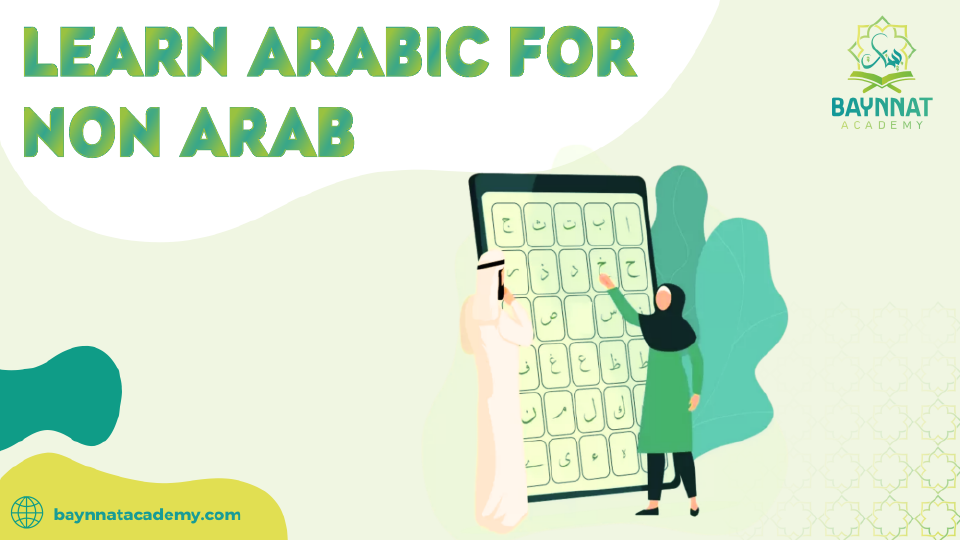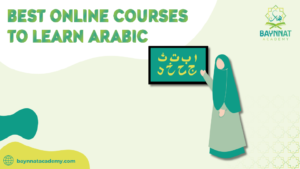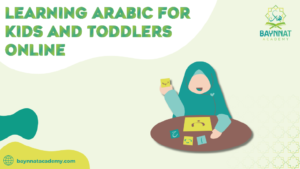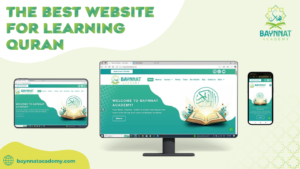Learning Arabic for non-Arabic speakers is a must because it provides access to rich cultures, history, and global connections. Arabic is essential for comprehending the Middle East and North Africa because it is one of the most widely spoken languages. It is also the language of the Quran, which is essential for Islamic studies. learn Arabic opens doors to regional literature, and art, and enhances cultural awareness. Undoubtedly, Arabic proficiency is advantageous in commerce, diplomacy, and international relations in a linked world. Learning Arabic is a journey that provides linguistic skills as well as a deep connection to a dynamic region of the world.
Learning Arabic is essential for Muslim non-Arabic speakers who want to enhance their relationship with the Islamic faith and its teachings. Understanding Arabic, the language of the Quran allows for a direct relationship with the divine scripture. It enables Muslims to understand the Quran’s message, pray with more understanding, and gain insights into Islam’s rich traditions. Non-Arabic speaking Muslims who learn Arabic can deepen their faith and spirituality, developing a better bond with the beloved Deen, Islam. This linguistic ability is a spiritual and intellectual gift that enhances their religious journey. Now, let’s explore some of the reasons that show why it is important to learn Arabic for non-Arabic speakers.
Importance of Arabic
Umar R.A. said,
‘Learn Arabic, for it strengthens intelligence and increases noble conduct.’
-
- Direct Quranic Connection: Learning Arabic offers a direct relationship to the Quran, providing a comprehensive understanding of Islam’s core book.
-
- Increased Faith: This linguistic proficiency strengthens the religious journey of non-Arabic speaking Muslims, allowing for a more meaningful connection with their faith through a better knowledge of prayer and religious practices.
-
- Cultural Understanding: Learning Arabic provides unique insights into the different traditions and cultural nuances of Arabic-speaking regions, encouraging cross-cultural understanding.
-
- Mental Stimulation: Learning Arabic is an intellectual activity that stimulates cognitive growth and improves language flexibility.
-
- Global Communication: Arabic proficiency helps communication in the many nations where it is spoken, extending one’s perspectives in a variety of circumstances.
-
- Business/Job Advancements: Arabic language skills open up a variety of job opportunities, particularly in diplomacy, international relations, and translation.
-
- Interreligious Dialogue: Knowledge of the Arabic language can facilitate interfaith exchanges by encouraging healthy discussions on religion, culture, and history.
-
- Language and Heritage Preservation: Learning Arabic helps to preserve a historically and culturally rich language and legacy.
-
- Access to Literature and Historical Records: Knowing Arabic gives you access to a variety of Arabic literature and historical documents, which will help you with your study and knowledge. Many of the hadith books and Tafseer can also be read in Arabic easily once you learn Arabic.
-
- Personal Growth: Learning a new language is a rewarding ability that fosters personal development, patience, and persistence, promoting a one-of-a-kind journey of self-improvement.
Do you dream about conversing in Arabic? Or do you want to learn Modern Arabic and explore the beauty of Saudi Arabia and North Africa? Well, you can enroll in our Modern Standard Arabic Course to learn Arabic.
9 Ways to Learn Arabic for non-Arabic speakers

- Establish Specific Language Learning Objectives to learn Arabic
Define your language learning goals precisely. These objectives will serve as your road map. For example, if you want to be fluent in conversational Arabic, define the level of fluency you want. Determine the precise topics you want to learn, such as grammar, vocabulary, or pronunciation, if your concentration is on comprehending Quranic Arabic.
- Select the Correct Arabic Dialect
The Arabic dialect you choose is determined by how you intend to utilize the language. If you intend to communicate with local speakers or visit a specific place, choosing the appropriate regional dialect is critical. Egyptian Arabic, for example, is widely understood due to Egypt’s impact on Arabic media. Although Levantine Arabic is widespread in the Levant region. Prioritize Modern Standard Arabic (MSA) and Classical Arabic if your goal is to understand written Arabic and classical materials. You can also opt to learn Arabic Grammar by enrolling in our Arabic Grammar Course.
- Create a Language Routine to learn Arabic for non-Arabic speakers
Developing a disciplined learning practice will accelerate your success rate in learning Arabic. Include reading, writing, listening, and speaking in Arabic as part of your daily routine. Begin with simple terminology and work your way up to more complicated sentences. Incorporate cultural exploration to gain a better grasp of the Arabic-speaking world.
- Becoming Immersed in Arabic Media
Immerse yourself in Arabic media to learn Arabic for non-Arabic speakers. It may be both entertaining and educational. Begin by viewing Arabic series and documentaries. Listen to Arabic video tutorials and try to imitate them. Begin with subtitles in your language to aid understanding. As your confidence grows, switch to Arabic subtitles and eventually strive to watch without them.
- Consistency and Daily Practice to learn Arabic for non-Arabic speakers
Daily practice is essential to learn Arabic. Set aside some time each day to practice your Arabic. Set attainable goals, such as acquiring a specific quantity of new words or practicing a specific grammatical topic. Increase the intricacy of the content you work with gradually over time.
- Participate in the Language Exchange Program to learn Arabic
Language exchange programs provide genuine language practice to learn Arabic for non-Arabic speakers. Some websites and apps connect you with native Arabic speakers who are studying your language. This mutually beneficial exchange allows you to talk in Arabic while also assisting your language partner in acquiring your original language. It’s a good approach to improving your speaking and listening abilities.
- . Use Arabic Learning Resources
A wealth of Arabic study resources are accessible to assist you on your path to learning Arabic for non-Arabic speakers. Structured lessons are provided by textbooks, online courses, and language learning apps such as Duolingo. Explore online forums and communities for Arabic learners to ask questions, share experiences, and discover language exchange partners. Furthermore, language learning websites also give platforms for writing practice and feedback.
- Seek Professional Advice to learn Arabic for non-Arabic speakers
Individualized guidance and comments can be provided by professional Arabic language tutors or instructors. They correct your pronunciation, provide personalized learning tactics, and focus on specific areas where you may need to improve to learn Arabic. Online platforms and tutoring programs make it simple to locate skilled Arabic educators who can assist you in reaching your language objectives.
- Enroll in Arabic Language Classes
When enrolling in Arabic language classes to learn Arabic, look at the curriculum and the tutors’ qualifications. Look for Arabic grammar, vocabulary, pronunciation, and cultural insights courses. Online courses allow you to learn at your own pace, whereas in-person programs allow for direct connections with professors and fellow students.
Are you looking forward to learning Arabic for non-Arabic speakers right from your home? Baynnat Academy is one of the best to help you excel in Arabic. You can explore many other courses that will help you connect with the Quran, Sunnah, and other parts of our Deen!
Explore now or try our free trial classes!



















